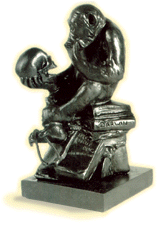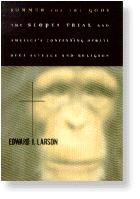 |
Research Magazine > ARCHIVE > Summer
97 > Article
Keeping the Faith
by Paul Karr
A poll and a prediction by a prominent psychologist were just what the nation
needed to spark a firestorm of controversy. And even though James Leuba's
poll took place in 1916, it continues to fuel heated debate today.
Leuba's survey of America's working scientists found that nearly half did not
believe in God, prompting him to proclaim that religion was dying and someday
would disappear.
His work touched off an anti-evolutionary movement that would culminate in
the historic Scopes trial where science and Darwinism faced off against Christianity
and creationism for the mind and soul of the American schoolchild.
But now, 80 years later, has that prediction turned out to be truth or folly?
Edward Larson, UGA professor of science law and science history and Pulitzer
Prize winning author, decided to find out.
"I am interested more in the trial than in what scientists believe, but
Leuba's questions are good ones," said Larson, whose latest book, Summer
for the Gods, re-examines the Scopes trial and its impact on American
society in great detail. "They provoke responses and give much more
insight into how people think than the vague Gallup poll question, 'Do you
believe in God?'"
So Larson replicated Leuba's methodology down to the letter. First he reprinted
the exact text of the Leuba survey. Then he located the same source Leuba used
to get the names of scientists, a thick reference book now called American
Men and Women of Science, and mailed the survey (even taking care to use the
same kind of reply envelope as Leuba) to 1,000 randomly selected names in the
book.
"I had no idea how it would turn out," Larson said.
When the responses had all been received and counted - 60 percent responded,
a high rate for surveys - Larson discovered something few would have predicted.
The same 40 percent of U.S. working scientists still believed in God (or at
least God as defined by James Leuba), while approximately 45 percent still
did not.
Among Larson's other findings: physicists were much less likely to believe
in a God than others, mathematicians much more likely to believe in one.
"It's interesting that it hadn't changed a lot," Larson said. "But
not necessarily surprising. In the 80 years before the survey, there had been
a huge change in scientists' thought because of Darwin and scientific positivism
and relativity. Before that, probably most American scientists would have indicated
belief in God.
"There really haven't been similar conceptual shifts in the 80 years since," he
said.
As many did in the Scopes trial seven decades ago, reporters covering Larson's
findings provided wildly differing accounts.
"It's being spun in different ways," he said. "The Christian Science
Monitor ran an editorial exhorting the fact that scientists still do believe
-despite the fact that well less than half of the scientists in my survey believed
in God - while the Journal of Humanism ran a piece proclaiming that they do not.
Is the glass half empty or half full?"
Larson himself became something of a short-lived media star when the results
were first published in the prestigious pages of the English journal Nature.
For two weeks, his UGA history and law school offices were deluged with interview
requests from major newspapers and radio stations all over the globe.
"I publish dozens of articles, and most of them my mother doesn't even read," Larson
said. "So I didn't expect this at all. It was quite a shock, and I'm glad
it's over."
For more information, e-mail Edward Larson at edlarson@uga.cc.uga.edu.
Summer for the Gods received a Pulitzer Prize this past April.
Return to Summer 1997 Index
Research
Communications, Office of the VP for Research, UGA
For comments or for information please e-mail the editor: rcomm@uga.edu
To contact the webmaster please email: ovprweb@uga.edu
|
| |

|
|

|

Ed Larson's book, Summer for the Gods, re-examines scientists' attitudes
toward God. |
|
|


